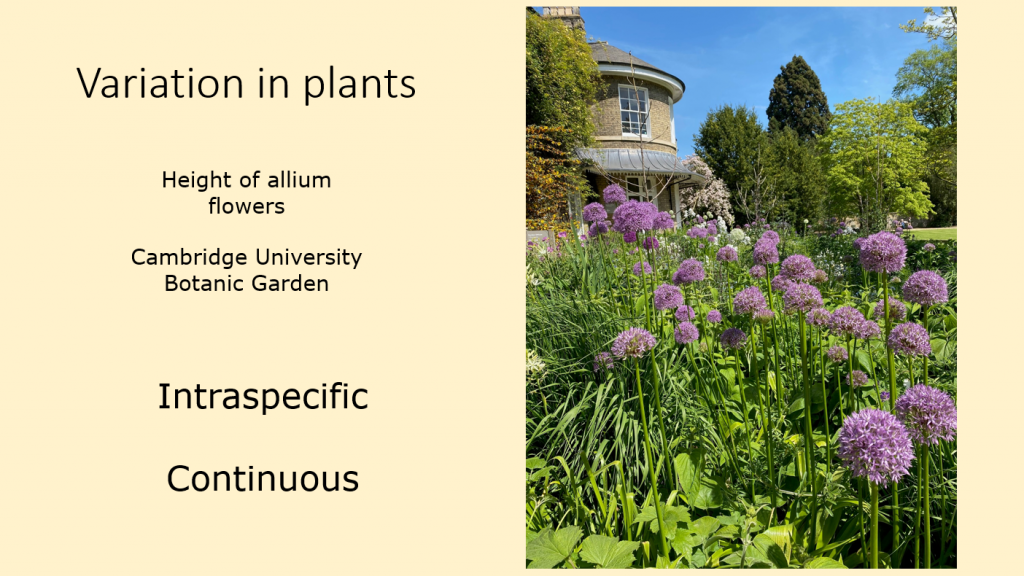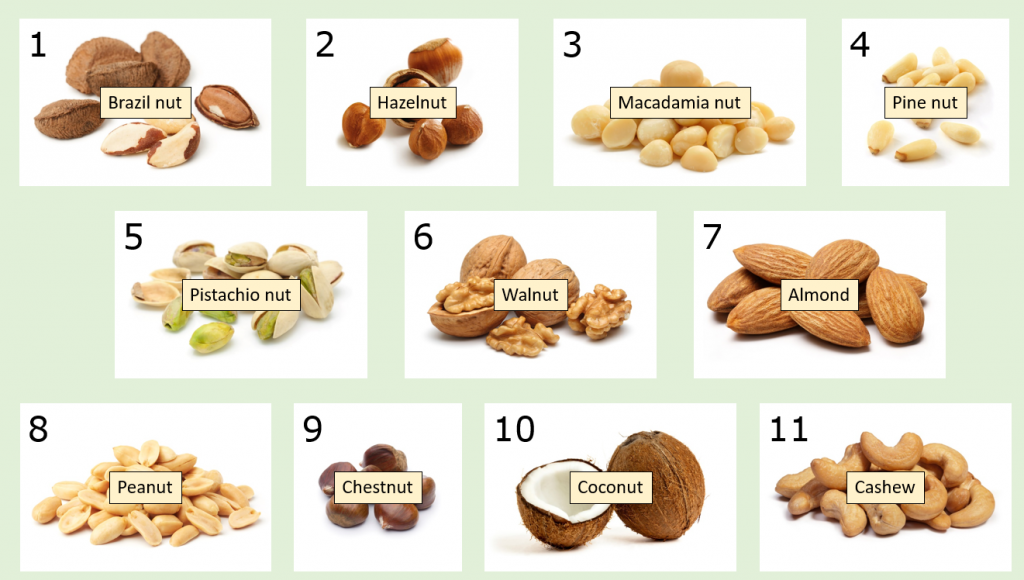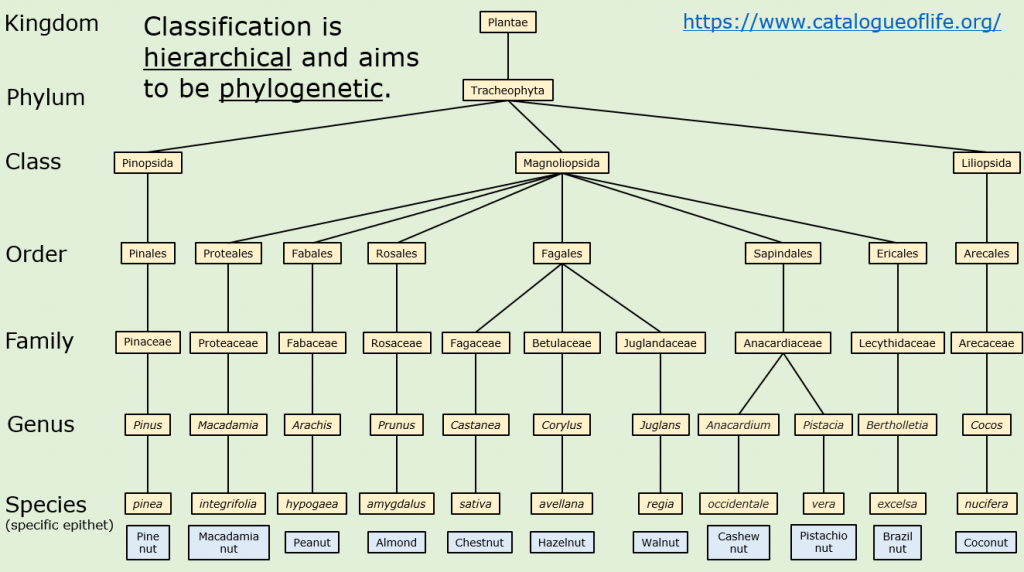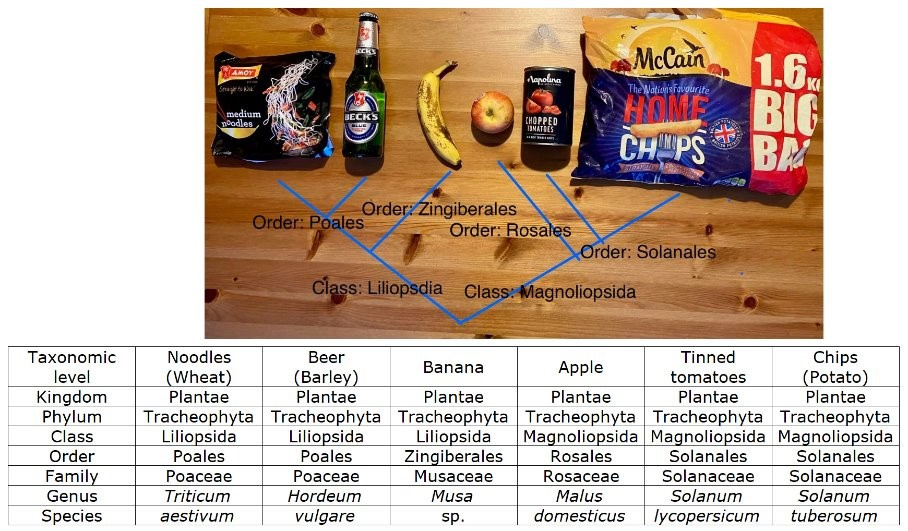
The need for a plant-rich education
The Royal Society of Biology recognises that plants have generally been under-represented in biology education. This is why their ‘Evolving 5-19 Biology: Recommendations and a framework for 5-19 biology curricula’ features its fifth recommendation. (Figure 1).

The observation that ‘there is a “leaky pipeline” of plant science undergraduates and workers’ indicates, of course, fewer plant scientists than is desirable for helping to address the climate and biodiversity crisis. After all, plant scientists study many of the things that will lead us through the difficult times ahead, such as:
- alternative protein sources to move to a more plant-based diet
- more efficient agriculture
- fossil fuel alternatives for energy and manufacturing
- agriculture that is more resilient to the stresses that a changing climate will bring
- natural carbon capture and sequestration
- ecosystem services such as flood protection
- the conservation and restoration of biodiversity.
However, it’s not just a lack of plant scientists or ‘plant-aware’ biologists and STEM graduates that is the problem. This lack exposure to plants, resulting in low plant positivity (i.e. low plant awareness or plant blindness) also has, I believe, an impact on our relationship with nature. It is one of the aspects of our current culture that had led us, as a society, to feel apart from nature, and to not value it as much as we should.
Sir David King, former chief scientific advisor to the UK government, emphasised this point and its urgency in the final the paragraphs of an article for the Guardian newspaper in May 2024. He commented:
‘Beyond policy changes and investment, a seismic cultural shift is imperative to steer humanity away from self-destruction towards a just and sustainable future. We must realign our political will, economic priorities and societal values to recognise that ecological wellbeing is matched to human wellbeing.
We often hear that in response to the climate crisis, we need to make sacrifices. But this framing is flawed. We must find joy in nurturing what is around us, from nature to the things we own. Fulfilment should come from quality, not quantity, and from nature, not new things.
We are a part of the natural world and depend on it. We can choose to transition our societies into a sustainable period of ecological civilisation. Over the coming decades, as we are faced with a self-inflicted set of global challenges, the need for such a cultural transformation will drive action. This process must begin now.’
Sir David King
Increasing students’ exposure to plants in a way that increases their positivity towards them is one way that we, as educators, can contribute to this ‘seismic cultural shift’ towards an ecological civilisation where ecological wellbeing is matched to human wellbeing.
At an individual level, it will help students find joy in the things they see every day in the world around them and gain fulfilment from nature. I would also argue that doing this supports our educational aim by enabling students to build an understanding that principles in biology apply to both plants and animals – very different organisms dealing with the same underlying challenges, solving them using the same principles but often in quite different ways.
Below, I explore some ways in which plants can be used to teach the topic of classification and evolution. But of course, plants could – and, I would argue, should – be used as contexts throughout biology, across all the sciences, and in all subjects including the arts and humanities.
A spotlight on classification and evolution
Classification and evolution is a good topic to explore increasing the use of plant contexts in the secondary classroom since it isn’t inherently an ‘animal’ topic or a ‘plant’ topic (not that I would recommend segregating biology into those two areas anyway). Many teachers and teaching resources, however, use solely or mostly animal contexts to teach this – the ‘zoocentrism’ mentioned by the Royal Society of Biology.
The zoocentric logic might be that students are more interested in animals and so will engage with the learning better if animal examples are used. If this is true, we need to address the problem rather than exacerbate it. This lack of plant positivity is potentially a major issue facing humanity’s ability to address the climate and biodiversity crisis and I believe we have a duty to tackle it.
So, how can we incorporate plant contexts into the teaching of classification and evolution throughout secondary and post-16 education, and how will this help improve students’ plant positivity?
Variation between organisms
Variation between and within species is a cornerstone for understanding classification and evolution. Students may need to be able to define inter- and intraspecific variation as well as understand the difference between continuous and discontinuous variation.
Plants are the most obvious part of the natural world around us and examples of both inter- and intraspecific, and continuous and discontinuous variation abound.
After covering the theory of variation in a lesson, I set students a homework task to take a photo of some plants, describe what form of variation the photo shows and share it with the class (we use Microsoft Teams). When setting this homework, we practice the use of the terms with photos that I have taken so that students can see what they are aiming for (Figure 2). The PowerPoint slides I use are available on the Science and Plants for Schools (SAPS) website.

This task asks students to apply the definitions they have learnt in class to the nature they see around them. They are forced to notice things around them in the natural world, be that in a local park, their garden, a window box, a meadow, or even just some houseplants. In a small way, this helps them engage more with nature and gain some joy and fulfilment from it. It also hopefully means that they are reminded of what they learnt in class when they see the same plants or similar examples in the future.
Evolution and natural selection
Students are all likely to be familiar with tea, chocolate and caffeine. They are less likely to consider the plants that these products come from, why they make those substances, or how that came about. One of the drivers for the evolution of caffeine is to act as an insect memory-aid in nectar for pollinators. This is not too dissimilar from the stimulant effects it has in humans and is therefore a relatable context for students. One aspect of increasing plant positivity is that we become more aware of where our food comes from. In doing so, we also become more connected to the world beyond ourselves and the processed food and drink we are often surrounded by.
What’s also interesting about this example is that the process of natural selection doesn’t involve survival or death – just pollination or the lack of it. After modelling the way natural selection can be explained using a ‘standard’ example, such as rabbits evolving to run faster due to predation from foxes, students can be stretched by being asked to explain this example. By doing so, they can see that the critical component for natural selection is reproduction rather than survival.
In addition to the evolution of this adaptation, it turns out that caffeine has evolved independently in the plants we make tea, coffee and chocolate from and so this context can be revisited when students learn about convergent evolution.
I discuss this context more fully in an article in the Association for Science Education’s School Science Review. A copy of the article and PowerPoint slides that could be used in lessons are available from the Science and Plants for Schools (SAPS) website.
Classification
Another opportunity to shine the spotlight on the plant behind the food is when teaching classification.
I have produced a resource for introducing the hierarchy of classification using various nuts (not in the formal botanical sense) that students are likely to be familiar with. I introduce the topic by asking students to pair up and identify 11 different types of nut from their photographs (Figure 3).

To highlight the plants they come from, the students then have to do the same with photographs of the nuts as they appear when growing on their plant. Once a link between the familiar and the plant is established, I use these species to show an example how the classification system works (Figure 4).

To follow on from this, I set students a homework I call ‘kitchen classification’. Students have to find food or drink items in their kitchen, look up the classification of their main plant ingredient in a spreadsheet provided and then create a classification diagram to share with the class. Figure 5 shows the example I use to model the task.

Food items are a rare opportunity for students to explore classification themselves, since identification of organisms in the wild can be challenging. Food items have a known name, or are labelled, and all students then need to do is to look up the classification of the main plant ingredient in a spreadsheet. I have written about this homework activity in a School Science Review article, which is available alongside the spreadsheet and other resources for this activity on the Science and Plants for Schools (SAPS) website.
Exploring the classification of food items allows students to see which plants are more closely related to others and brings the concept of classification, evolutionary relatedness and the connectedness of all organisms into their everyday lives.
Human-induced evolution
The peppered moth (Biston betularia) is a commonly used example of evolution occurring over a relatively short period of time in response to human impact on the environment. An alternativei (or addition) to this context is the evolutionary story of Fritillaria delavayi, a plant used for traditional medicine in China. In their Current Biology article entitled ‘Commercial harvesting has driven the evolution of camouflage in an alpine plant’, Yang Niu, Martin Stevens and Hang Sun show that how closely plant colour matches the background in different populations correlates with human harvest pressure in that area and that plant concealment greatly influences the search time of humans.
Students could be taught the steps to describe the process of evolution using one of these examples and then asked to use those steps to explain the evolution in the other. The research article is also a great example of the scientific process and getting older students to engage with the primary research could increase the learning value of this context.
Statistics
The final opportunity I’m going to talk about here is teaching statistics, which comes up in the A-level biology course I teach.
In the past, I taught statistics with made-up datasets. This was perfectly suitable for training students in statistics but missed an opportunity to enhance their learning by using contexts that could make them think deeply about the world around them. One such context is weather data (from the Met Office) and linking it to crop yield data (from the UK Government).
Before starting teaching statistics, I use some time to develop students’ appreciation of the importance of crop yield to a wide range of issues, such as the economy, climate change and land use. Through exploring the topic we see that, although there is no significant difference in mean wheat yield per hectare in a recent decade compared to the one before it, the standard deviation is now higher, and we discuss what this means for the probability of getting very low crop yields.
We see that wheat yield correlates with barley yield, so growing both wheat and barley wouldn’t mitigate against a low yield year. We also see that, although annual temperature and rainfall do not correlate with wheat yield, rainfall in March positively correlates with yield whereas rainfall in September negatively correlates. We then discuss whether this suggests that more variable weather patterns due to climate change could be a reason why the standard deviation in wheat yield is now higher than it was.
The resources for this are in the process of being adapted for the Science and Plants for Schools (SAPS) website. If you’d like to find out when they get uploaded, please sign up to the SAPS newsletter.
Conclusion
Improving plant positivity in students by incorporating more plant contexts into your teaching is one way biology teachers can support the generation of future plant scientists and the move towards an ‘ecological civilisation’ which Sir David King says is so desperately needed. Classification and evolution is one area where you can start doing this.
There are, of course, many other areas of biology in which more plant contexts can be used. A list of suggestions is available in a spreadsheet on the Science and Plants for Schools (SAPS) website.
Education is where students learn how to make healthy choices to help them have a bright future. It is also where students have impressed on them the importance of certain critical values for a well-functioning society. Plant positivity, an appreciation of nature and a connectedness to nature fall in both those camps. Although we aren’t formally directed to help students develop in this area, it undoubtedly falls within the principles underlying those two purposes of education.
Chris Graham is the Sustainability Lead and a Biology teacher at Hills Road Sixth Form College. He is also the visiting teacher at Science and Plants for Schools (SAPS).
Register for free
No Credit Card required
- Register for free
- Free TeachingTimes Report every month